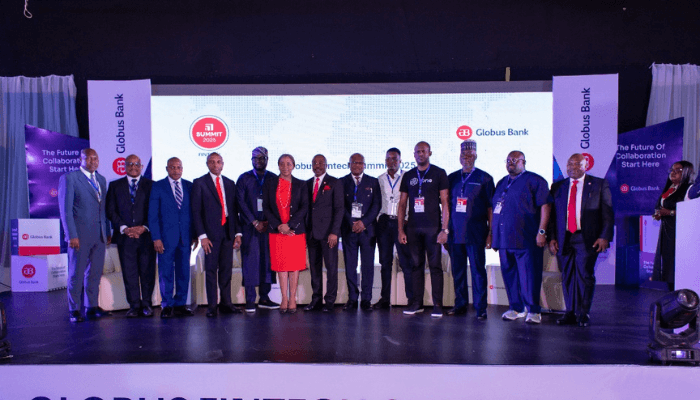Experts from Nigeria’s banking and fintech sectors agreed that the future of financial innovation rests on collaboration and artificial intelligence (AI), with trust, governance, and strategic partnerships serving as the key drivers of inclusive and resilient growth.
During the Globus Bank Fintech Summit 2025, themed “Collaborative Intelligence: Accelerating the Fintech Frontier,” held in Lagos. Elias Igbinakenzua, managing director and CEO of Globus Bank, set the tone by emphasising that Globus Bank has intentionally chosen a collaborative approach.
The bank’s strategy is built on three core pillars: empowerment, openness, and compliance support.
“It empowers fintechs through robust APIs and infrastructure, embraces openness by treating its systems as enablers for growth rather than guarded assets, and ensures strong compliance handholding, requiring fintechs to meet high KYC and governance standards while providing guidance and support throughout the process,” he said.
For Bola Omole, chief information officer at Globus Bank, collaboration between banks and fintechs is not just desirable but fundamental.
He urged banks to focus on their strengths, regulatory compliance, KYC, and risk management while fintechs innovate around customer needs.
“By trusting each other’s roles,” he said, “we can build solutions that foster speed, trust, and economic growth.”
Suru Avoseh, CEO of BluSalt, added that the relationship between banks and fintechs has evolved from competition to cooperation.
“True collaboration,” he noted, “is less about sharing APIs and more about building complementary strengths. Banks bring credibility and trust, while fintechs offer agility and consumer insight.”
From Globus Bank’s standpoint, Omole, the bank’s CIO, identified lending as a key collaboration frontier where fintech data insights meet banks’ balance sheet strength to deliver accessible, sustainable credit.
However, Wale Adeyipo, managing director of CWG, cautioned that partnerships must account for risk. He warned that while collaboration unlocks opportunity, it also exposes banks to new fraud and compliance challenges.
“We must build for scale through structured partnerships and invest in human capital,” he said, adding that without skilled people, “technology-driven growth cannot be sustained.”
The conversation also spotlighted leadership, infrastructure, and governance. Seyi Ebenezer, CEO, PayAza, emphasised that fintechs must prioritise strong corporate governance to build enduring institutions.
“Appointing leaders with the right experience and posture,” he argued, “is critical for structures that can inspire regulatory and investor confidence.”
On her part, Onyinye Olisah, MD/CEO, PayOnUs, pointed to infrastructure reliability as a major weakness, urging banks to adopt redundancy systems similar to those in the airline and telecom sectors to minimize transaction downtime.
Regulatory perspectives were equally sharp. Oladimeji Akano, Country Director for Nigeria, OnAfriq, argued that some fintech roles, such as CEO and CFO, pose higher systemic risks and therefore demand stricter oversight.
He also stressed the need for balance, allowing innovation to thrive in less sensitive areas.
To improve regulatory compliance among banks and fintechs, Akano advised that fintechs should engage regulators early in their innovation journeys, proposing continuous workshops to co-create adaptive compliance frameworks.
Emmanuel Babalola, chief commercial and growth officer, FINCRA, broadened the discussion, warning that liquidity and settlement risks could challenge the next phase of fintech growth.
“Without deeper synergy between banks and fintechs, inclusion targets may stall,” he said, identifying identity, trust, and settlement as the key pillars for long-term progress.
On the technology front, Ayotunde Coker, CEO, Open Access Data Centre, described AI as both a defensive and offensive force, capable of securing systems and driving scale. Niyi Toluwalope echoed that AI must be embedded into core financial processes for personalisation, credit scoring, and risk management.
Ngover Ihyembe-Nwankwo, executive director at NIBSS, warned that as AI-driven cyber threats evolve, collaboration will be the industry’s strongest defense. “Trust is the currency of the financial system,” she said. “Once lost, it’s nearly impossible to regain.”
Closing the session, Chuks Okoh of CoralPay reminded participants that technology must ultimately serve the customer.
“AI can help institutions understand consumers deeply and protect them,” he said.
The Globus Bank Fintech Summit 2025 affirmed that the future of finance will not be shaped in isolation but through collective intelligence, bold innovation, and trust-driven partnerships. By championing collaboration and harnessing the power of artificial intelligence.
Globus Bank is positioning itself at the forefront of Nigeria’s fintech evolution, driving inclusion, resilience, and sustainable growth. With this commitment, Globus Bank stands ready to help shape a financial future that inspires confidence locally and commands leadership on the global stage.









